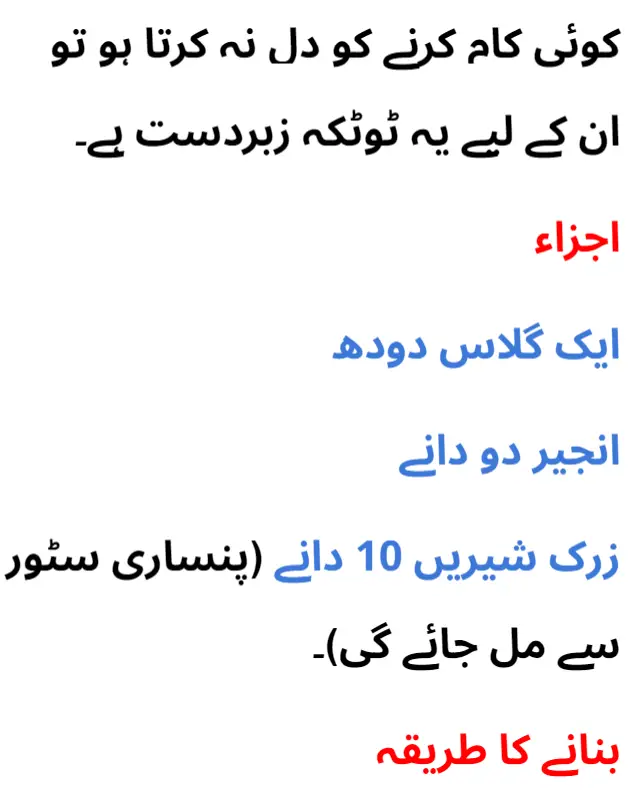
Fatigue symptoms are feelings of tiredness, weakness and lack of energy. It can be caused by many things like physical activity, stress, illness, and poor diet. Fatigue can also be a symptom of a disease like anemia (iron deficiency), thyroid problems, or depression. If you are feeling fatigued then there are a number of things you can do to boost your energy levels naturally.
To naturally increase your energy levels get enough sleep, eat a healthy diet, and exercise regularly. However if you are still feeling fatigued and tired after making lifestyle changes and having a balanced food then you should start taking vitamins or supplements to get rid of fatigue.
Fatigue Treatment with Home Remedy (Urdu)

Here is a natural home remedy for fatigue treatment. The ingredients are one glass of milk, two figs, and ten black barberries (zarshak shireen). Take one glass of milk and put two figs and ten black barberries in it. Then, heat the milk for 2 minutes. Eat the black barberries and figs, and then drink the milk. Use this remedy at night.


Second Home Remedy for Tiredness and Fatigue: To make this remedy, you will need two cloves, a half-inch of cinnamon powder, and a half-inch piece of ginger. Place all of these ingredients in a glass of water. Boil the water for 5 minutes, and then drink it.


Before we talk about fatigue treatment with vitamins and supplements, let’s talk about fatigue symptoms in males and females.
Fatigue Symptoms:
- Feeling tired all the time, even after getting enough sleep
- Lack of energy
- Difficulty concentrating
- Difficulty making decisions
- Mood swings
- Depression
- Muscle weakness
- Headache
- Dizziness
- Shortness of breath
- Sleep problems
- Decreased appetite
- Weight loss or gain
Fatigue Treatment with Vitamins and Supplements
Vitamin B12
Vitamin B12 is essential for energy production and red blood cell formation. A deficiency in vitamin B12 can lead to fatigue, weakness, and shortness of breath. Vitamin B12 is found in animal products such as meat, fish, poultry, and eggs. You can take the vitamin B complex after consulting with your doctor.
Iron
Iron is another important nutrient for energy production. It is responsible for carrying oxygen from the lungs to the rest of the body. A deficiency in iron can lead to fatigue, anemia, and shortness of breath. Iron is found in foods such as meat, poultry, fish, beans, lentils, and fortified cereals. You can take iron supplements in tablet form
Magnesium
Magnesium is a mineral that is involved in many bodily functions, including energy production, muscle function, and nerve function. A deficiency in magnesium can lead to fatigue, muscle cramps, headaches, and insomnia. Magnesium is found in foods such as nuts, seeds, whole grains, and leafy green vegetables.
Coenzyme Q10 (CoQ10)
CoQ10 is a substance that is in all of your body’s cells. It is essential for energy production and cell function. CoQ10 levels decline with age, which may contribute to fatigue. CoQ10 is found in foods such as meat, fish, nuts, and seeds.
Ashwagandha
Ashwagandha is an adaptogenic herb which means that it helps the body cope with stress and decreases cortisol levels. Ashwagandha has been shown to improve energy levels, reduce stress, and promote better sleep quality. Ashwagandha is available in the form of capsules, tablets and powder.
Rhodiola Rosea
Rhodiola rosea is another adaptogenic herb that has been shown to improve energy levels, reduce fatigue, and enhance cognitive function. Rhodiola rosea is available in the form of capsules, tablets, and powder.
Reasons for Fatigue in Females
There are several reasons why females are more likely to experience fatigue than males. Here are the top reasons for fatigue in females
Hormonal changes: Females experience significant hormonal changes throughout their lives, including during menstruation, pregnancy, menopause, and perimenopause. These hormonal changes can lead to a variety of symptoms, including fatigue.
Iron deficiency: Iron is an essential mineral that is necessary for the production of red blood cells. Red blood cells take oxygen to the body’s tissues. Iron deficiency is more common in females than males, especially during menstruation and pregnancy. Not having enough iron can make you tired, anemic, and sick.
Magnesium deficiency: Magnesium is another essential mineral that is involved in many bodily functions, including energy production, muscle function, and nerve function. Magnesium deficiency can lead to fatigue, muscle cramps, headaches, and insomnia. Magnesium deficiency is also more common in females than males.
Stress: Females are more likely to experience stress than males. Stress can lead to a variety of health problems, including fatigue, anxiety, and depression.
Sleeplessness: Females are more likely to experience sleep deprivation than males. This lack of sleep can result in tiredness, difficulty concentrating, and irritability.
Chronic health conditions: Females are more likely to experience some chronic health conditions like fibromyalgia, chronic fatigue syndrome, and rheumatoid arthritis. These chronic health conditions can cause fatigue and other symptoms.






